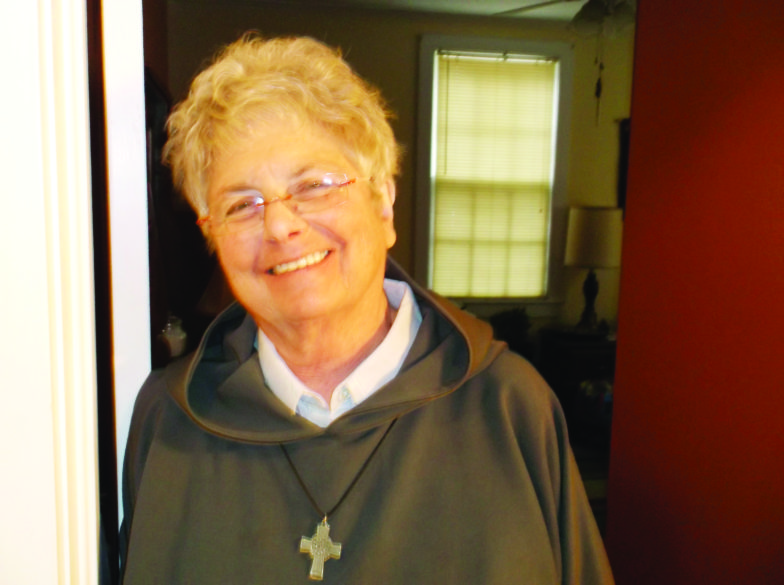
From the hermitage
By Sister alies therese
I’ve never given plagues much thought. Stunned by AIDS (1980s) and hearing of various pestilence ‘over there’ in Africa or India … but not here! I was a polio pioneer but don’t remember if I got the real stuff or the placebo. Even the ‘white plague’ (TB) has largely been relegated to medication.
In Derbyshire, England, on the grounds of the Parish Church of St. Lawrence, stands a large 8th century stone cross looking out over Plague Village. What a name!
There are black plagues, bubonic plagues, leprosy, SARS, polio, AIDS, anthrax, H1N1, ebola, bird flu, dengue fever, Spanish flu, TB, and, of course, this horrid “19.” Consider these folks:
St. Louis died of plague in Tunisia during a crusade in 1270. St. Julian of Norwich, England, 1416, was an anchoress, lived through three plagues.
Martin Luther wrote Whether One May Flee From a Deadly Plague, where he discussed whether a pastor (or others) might ‘run away’ if their life was in danger. Germany, 1527.
In Mexico, Our Lady of Guadalupe appeared in 1531 between the European small pox invasion and later hemorrhagic fevers. St. Martin de Porres, OP of Peru, 1630’s, nursed the sick midst the plague.
Venerable Dorothy Day (Kings County Hospital, Brooklyn), 1918, nursed the epidemic sick and Sts. Francisco and Jacinta Portugal, 1919-20, both died of plague.
St. Julian was six when the black death hit Norwich in 1348 and resurged in 1362 and 1369. Clearly, for most of her life the terrors of plague and death surrounded her.
Author, Ritamary Bradley explores St. Julian’s writings in Julian’s Way:
“Julian insists this present situation requires the impossible to be well. God answers gently: ‘True, you cannot do the impossible. But, I can. Hence all things can be made well.’ (32)
St. Julian talking with the Lord: ‘Really what kind of a mother are you? All is not well: none of these things (ravaging disease, hunger, pain …) are being made right, are they?’
To us God sounds defensive: ‘I didn’t say that! I did not say you would not be tempted. Did I say you would not be travailed?’
‘Then what did You say?’
God answers this time ‘sharply:’ ‘What I said is that you will not be overcome.’ (68). In the end we will sing a mighty chorus: ‘Indeed, this is the way things are, and it is well.’ For we shall then see …’”(85).
I wonder if Julian’s religious sensibility of devotion to the Passion of Christ wasn‘t formed around the plague pains and anguish she heard at her window and saw in her prayer?
Venerable Dorothy Day (d. 1980), not unlike many of our first responders, was young and still trying to find her way to God and her way to serve. So, she went to nursing school, just in the nick of time.
“One afternoon when I had been cleaning up filth all day, and the perverse patient had again thrown her bedpan out on the floor dirtying my shoes and stockings, I left the ward in tears … this was the time of the ‘flu’ epidemic and the wards were filled and the halls too. Many of the nurses became ill and we were very short-handed. Every night before going off duty there were bodies to be wrapped in sheets and wheeled away to the morgue. When we returned in the morning, the night nurse was performing the same grim task. (D. Day, The Long Loneliness, HarperOne, 1952).
What would be well? All? Really?
I want to remember what Governor Cuomo said: “The cruelest irony is the poorest pay the highest price.” Just look around, not only Mississippi, but the world! Not only the dying patients but the frontline workers. Did you see the pic of the masked kneeling six-year-old, Alen Zelada at night prayer on Junin St., Guadalupe, NW Peru? When asked why he was there said he wanted to be sure God heard him. His house was noisy. He wanted an end to the sickness … people are dying.
Offer what kind of service you can and note that during this time of anguish we can either be lonely or alone. Community is formed in many different ways. Love is needed for all to be well!
“We have all known the long loneliness and we have learned that the only solution is love and that love comes with community.” (D. Day)
(Sister alies therese is a vowed catholic solitary who lives an eremitical life.)
